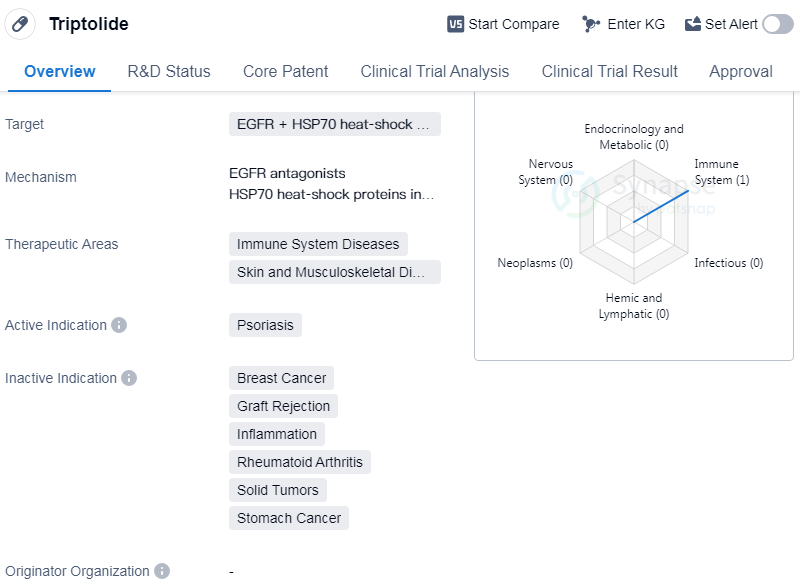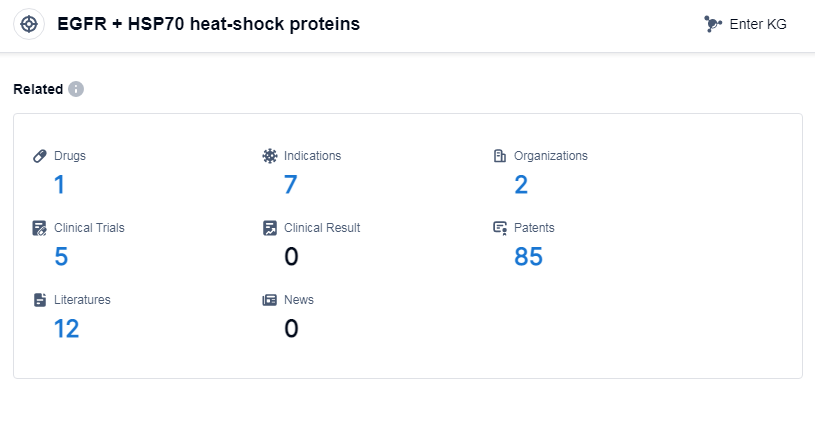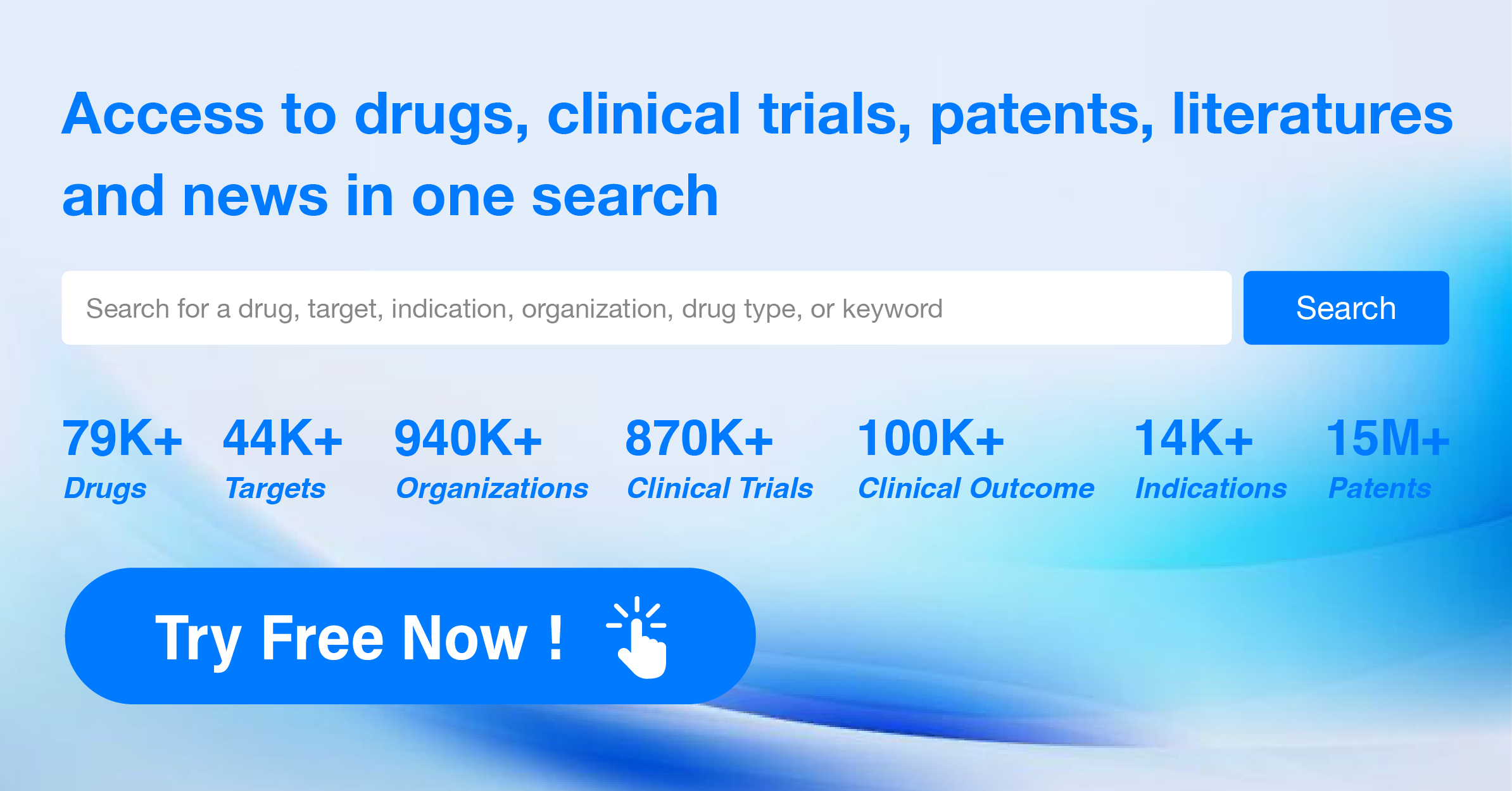Triptolide Unveiled: A Detailed Overview of its Revolutionary R&D Breakthroughs
Triptolide's R&D Progress
Triptolide is a small molecule drug that targets epidermal growth factor receptor (EGFR) and heat-shock protein 70 (HSP70). It is primarily used in the treatment of immune system diseases, skin diseases, and musculoskeletal diseases.
The active indication for Triptolide is psoriasis, which is a chronic autoimmune disease that affects the skin, causing red, scaly patches that can be itchy and painful. Triptolide has been approved for use in the treatment of psoriasis in global markets, indicating its efficacy and safety profile.
As a small molecule drug, Triptolide is designed to interact with specific molecular targets in the body, in this case, EGFR and HSP70. EGFR is a protein that plays a crucial role in cell growth and division, and its dysregulation has been implicated in various diseases, including cancer. HSP70, on the other hand, is a heat-shock protein that helps protect cells from stress and damage. By targeting these proteins, Triptolide aims to modulate the immune response and alleviate the symptoms associated with psoriasis.
The therapeutic areas of immune system diseases, skin diseases, and musculoskeletal diseases highlight the potential versatility of Triptolide in treating a range of conditions. Immune system diseases encompass a wide range of disorders, including autoimmune diseases, allergies, and immunodeficiencies. Skin diseases, such as psoriasis, eczema, and dermatitis, can significantly impact a person's quality of life. Musculoskeletal diseases, including arthritis and osteoporosis, affect the bones, muscles, and joints, leading to pain and mobility issues.
👇Please click on the image below to directly access the latest data (R&D Status | Core Patent | Clinical Trial | Approval status in Global countries) of this drug.
Mechanism of Action for Triptolide: EGFR antagonists and HSP70 heat-shock proteins inhibitors
EGFR antagonists are a type of medication that specifically target and inhibit the activity of the EGFR. The EGFR is a protein found on the surface of cells and plays a crucial role in regulating cell growth and division. By blocking the activity of EGFR, these antagonists can help to slow down or stop the growth of cancer cells, as many types of cancer rely on EGFR signaling for their growth and survival.
HSP70 heat-shock proteins inhibitors are drugs that target and inhibit the activity of HSP70. HSP70 is a type of protein that helps cells respond to stress, such as heat or chemical exposure. It plays a role in protecting cells from damage and promoting their survival. Inhibiting HSP70 can have therapeutic benefits in certain diseases, particularly cancer. By blocking the activity of HSP70, these inhibitors can disrupt the protective mechanisms of cancer cells, making them more susceptible to cell death or other treatments.
Drug Target R&D Trends for Triptolide
According to Patsnap Synapse, as of 15 Sep 2023, there are a total of 1 EGFR and HSP70 heat-shock proteins drugs worldwide, from 2 organizations, covering 7 indications, and conducting 5 clinical trials.
The analysis of the current competitive landscape for target EGFR and HSP70 heat-shock proteins reveals that the Chinese Academy of Sciences and MOH Holdings Pte Ltd. are the companies growing fastest in this area. The highest stage of development for this target is the inactive phase.
One drug has been approved for the indication of Psoriasis, indicating progress in the development of drugs targeting EGFR and HSP70 heat-shock proteins for this indication. However, there is a need for further research and development efforts for other indications such as solid tumors, inflammation, breast cancer, rheumatoid arthritis, graft rejection, and stomach cancer.
Small molecule drugs have shown promise in targeting EGFR and HSP70 heat-shock proteins, with one drug approved and one in the inactive phase of development.
China has shown significant progress in the development of drugs targeting EGFR and HSP70 heat-shock proteins, with one drug approved and one in the inactive phase of development. Overall, the current competitive landscape for target EGFR and HSP70 heat-shock proteins indicates ongoing research and development efforts, with potential for future advancements in therapeutic options for various indications.
👇Please click on the picture link below for free registration or log in directly if you have a freemium account, you can browse the latest research progress on drugs, indications, organizations, clinical trials, clinical results, and drug patents related to this target
Conclusion
In summary, Triptolide is a small molecule drug that targets EGFR and HSP70 heat-shock proteins. It has been approved for the treatment of psoriasis, a chronic autoimmune disease affecting the skin. Its approval in global markets indicates its safety and efficacy. Triptolide shows potential in treating immune system diseases, skin diseases, and musculoskeletal diseases, offering hope for patients suffering from these conditions.






